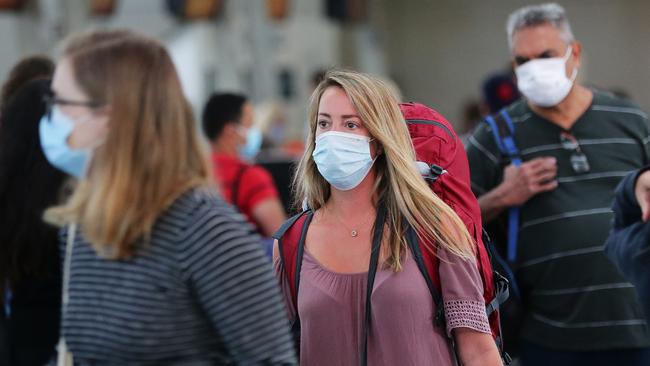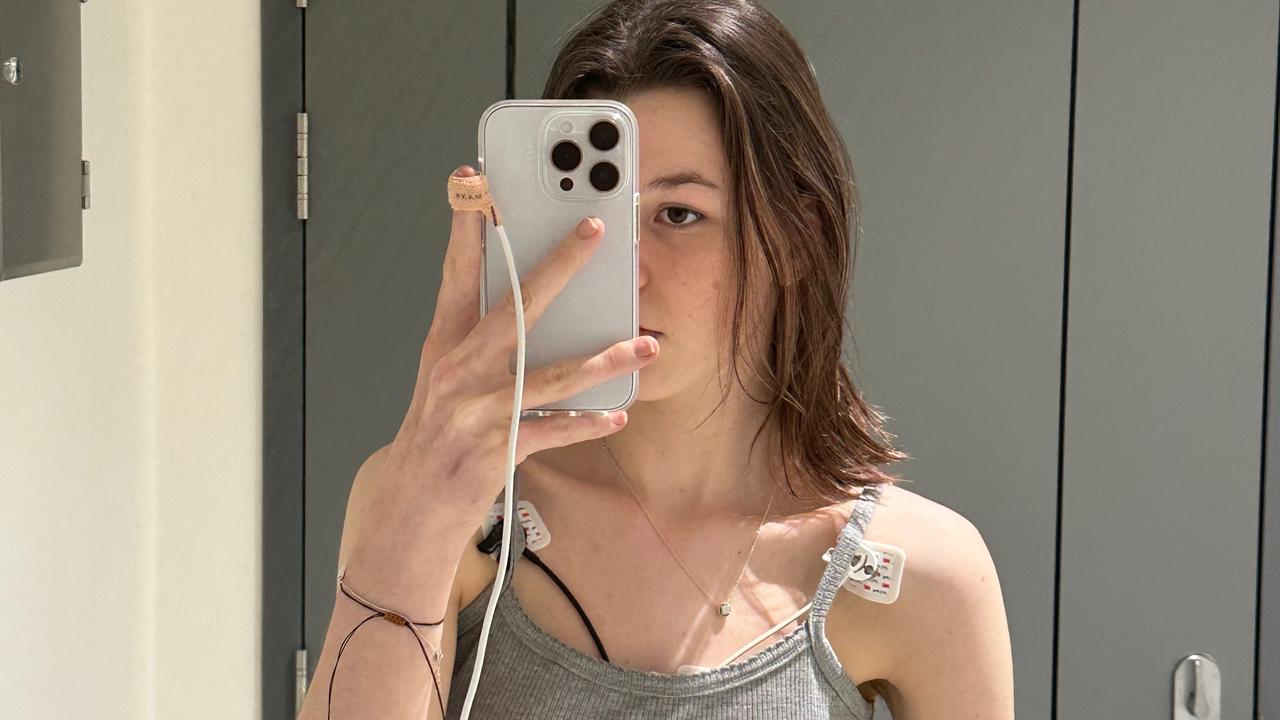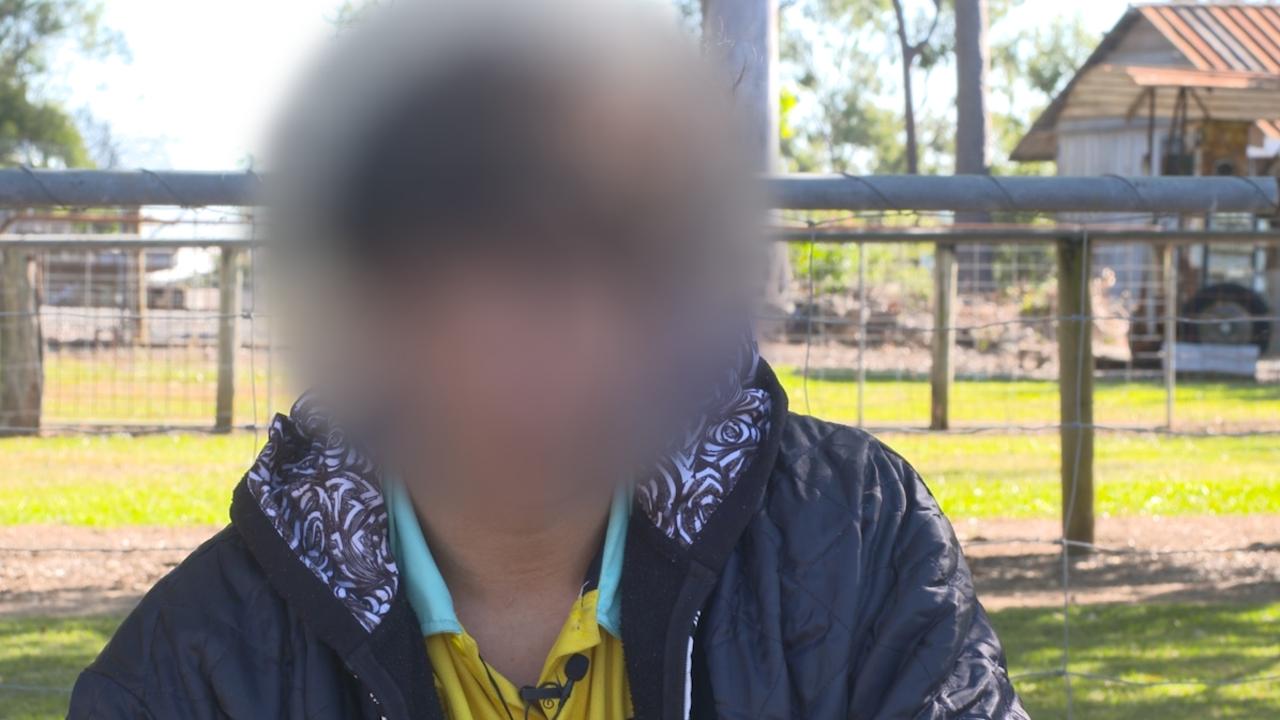SA imposes border restrictions for visitors from NSW as northern beaches cluster continues to expand
People travelling to SA from Sydney must now go into quarantine and border checkpoints are being set up as the NSW coronavirus cluster expands.
Coronavirus
Don't miss out on the headlines from Coronavirus. Followed categories will be added to My News.
Christmas plans across the country have been thrown into chaos as states imposed hard borders in response to Sydney’s coronavirus outbreak.
South Australia on Sunday joined other states in restricting movement, locking out those from the harbour city’s Northern Beaches, and imposing quarantine and a tough testing schedule for anyone coming from greater Sydney.
South Australia also recorded its first coronavirus cases in a week, with three women in hotel quarantine testing positive.
Under the new border restrictions, people who have been to Sydney’s Northern Beaches have been banned from entering South Australia entirely, while people who have been in Greater Sydney will be required to quarantine for 14 days.
Regional NSW residents will be allowed to enter SA unrestricted, but will be required to take coronavirus tests on their first, fifth and 12th days in the state.

The rules took effect at midnight, but there was widespread confusion on Sunday evening, with claims travellers arriving into SA from Sydney were told to quarantine, hours before the deadline. SA Police have since issued new information to clarify the rules.
The new restrictions have thrown Christmas plans for many people into disarray and will be another blow to SA’s hard-hit hospitality sector.
Australian Hotels Association general manager Ian Horne said December would be a “lousy end to a lousy year”.
“Our best shot at the moment will be South Australians having a weekend in a luxury hotel in the city, which is something they might not normally do,” Mr Horne said.
He said the extension of travel vouchers to January – $100 at selected city venues and $50 in the regions – would help.
A South Australian Tourism Commission spokeswoman said the impact of the latest restrictions on incoming bookings was being assessed.
In NSW, 30 new cases were announced on Sunday – 28 of which were on the Northern Beaches. A further 15 new NSW COVID cases were announced today.
SA’s cases – all overseas arrivals quarantined in medi-hotels – were one woman aged in her 60s and two women in their 20s.
Chief public health officer Professor Nicola Spurrier said the women posed no risk to the public.
SA Police on Sunday set up border checkpoints and testing stations at four main road entry points from NSW – Oodla Wirra, Yamba, Wentworth and Pinnaroo.
SA Pathology staff have also been stationed at Adelaide Airport to test people flying in from NSW.
Premier Steven Marshall said the restrictions would “significantly affect Christmas travel plans” and the decision to close the borders had not been taken “lightly”.
“This is the best way we can protect South Australia from any seeding into our state, especially as we lead up to Christmas,” Mr Marshall said.
Prof Spurrier said she had “increasing concern” about the situation in NSW but it was “mostly in the Northern Beaches local government area and the NSW public health team are absolute gold standard at doing their contact tracing”, she said.
“I think we can feel quietly positive about what’s happening in NSW but we do need to put things in place to make sure that South Australia remains safe.”
Victoria on Sunday imposed even stricter rules, with a travel ban on people from Sydney and the NSW Central Coast that requires them to spend 14 days in hotel quarantine.
The number of cases in Sydney’s Northern Beachescluster has now grown to 71.
Sydney locations outside of the Northern Beaches, including a number of suburbs in the city’s inner west, have also been put on notice after it was shown that they were visited by people who later tested positive.
In regional NSW, Broken Hill Mayor Darriea Turley said her community had been on edge waiting to see how South Australia reacted to the outbreak.
She said she was relieved regional NSW residents were still allowed entry.
“Our focus has always been on the SA border. We’re pleased that common sense has prevailed and you’re focused on the hotspots,” she said.
NSW residents last week dashed to SA amid the outbreak in a bid to arrive early for the festive season before any new restrictions came into place.
They were also concerned about future rule changes, including the potential for SA residents visiting Broken Hill to be forced into quarantine upon their return, which could prevent families from reuniting for Christmas.
“One grandmother told me she’d actually brought all the presents back with her when she went down recently so when her family came with the grandchildren they didn’t have to worry about car space,” Ms Turley said.
“We were talking about the fact they might have to meet on the SA border and push the cars and pushbikes across.”
FROM SATURDAY
Cars with NSW number plates will be randomly checked as authorities rely on an “honour and trust” traveller system to stop the growing Sydney coronavirus outbreak from spreading into South Australia.
The border remained open on Saturday night – before tighter restrictions were announced on Sunday – as SA’s top cop, and its COVID-19 health chief, kept close tabs on the surging Avalon cluster that triggered an emergency four-day lockdown of Sydney’s northern beaches.
SA Health contact tracers also ordered at least 180 people who visited three Sydney “hotspots” into home isolation, after identifying almost 6000 NSW travellers who have arrived in SA in the past 10 days.
SA Health on Saturday night issued new urgent warnings over four new Sydney hotspots including Cronulla in the south, Lane Cove on the north shore, Turramurra in the north-east and inner east Woolloomooloo.

Authorities asked travellers if they had visited “high community transmission zones” in Sydney’s Northern Beaches Council area, lower North Shore harbourside suburb Lavender Bay and Penrith, in the western suburbs, since Friday last week.
Officials also wanted information on any trips to the two “high-risk super spreader” locations in beachside Avalon at particular times – an RSL club on December 11, as well as the Bowlo bowling green last Sunday from 5-7pm and last Tuesday from 3-5pm.
Another three Adelaide Oval Test cricket match attendees were in medi-hotel quarantine on Saturday night after being identified as close contacts of reported NSW patients.
While the trio returned negative tests – and will be tested twice more in the next fortnight – an SA Health spokeswoman said “this highlights the need for every South Australian to follow COVID-safe practices, particularly when attending large events”.
After what sources claimed was a “rev-up” from chief public health officer Nicola Spurrier to oval bosses on Friday, officials on Saturday introduced new safety measures including crowd alerts, more QR code readers and a security crackdown.
Oval wastewater testing failed to find virus evidence but eating and drinking while standing in non-ticketed areas such as the “village green” was banned and mask use urged.
The state’s COVID-19 co-ordinator, Police Commissioner Grant Stevens, convened urgent talks early Saturday with key government officials including Prof Spurrier.
Western Australia resumed its hard border with NSW on Saturday night. The Queensland, Victorian and Tasmanian governments also tightened border controls and threatened to ban travel amid more outbreaks.
The Sydney to Hobart yacht race was called off after the Tasmanian government announced travellers from Greater Sydney would need to quarantine for two weeks. The quarantine rule effectively ended any hope the Sydney to Hobart can go ahead as planned at 1pm on Boxing Day as it has for the past 75 years.
There are grave doubts the Sydney Test will go ahead due to the complication of border restrictions.
An SA Police spokesman said road checkpoints were not being relaunched – days after Mr Stevens announced unrestricted travel – and officers were “relying on an honour and trust” traveller system.
“Patrols will be conducting random checks on roads around the state, along the borders and of any vehicles with NSW number plates,” the spokesman said.
“People will be asked to provide evidence they have permission to enter the state. If they are found to be from any of the high community transmission zones, patrols will safely escort them to a place of their choosing to quarantine or a medi-hotel.”
Premier Steven Marshall told the Sunday Mail our authorities believed the cluster was under control but warned new restrictions would be imposed if the outbreak exploded.
He said the “excellent information flow”, combined with constant close contact between Mr Stevens and NSW Police Commissioner Mick Fuller, had left local officials “satisfied” authorities “will stay on top of this cluster”.
“It is a worrying situation, there’s no doubt about that, but at this stage the health advice to police is to just to continue to monitor,” he said.
“If we started to see further seeding across a greater area, and the contact tracers are getting behind in their ability to lock down NSW, then we would not hesitate in moving more quickly to secure our borders.”
With the number of cases set to rise on Sunday, NSW Premier Gladys Berejiklian supported state leaders declaring “hotspots” but pleaded against unnecessarily ruining Christmas travel plans.


